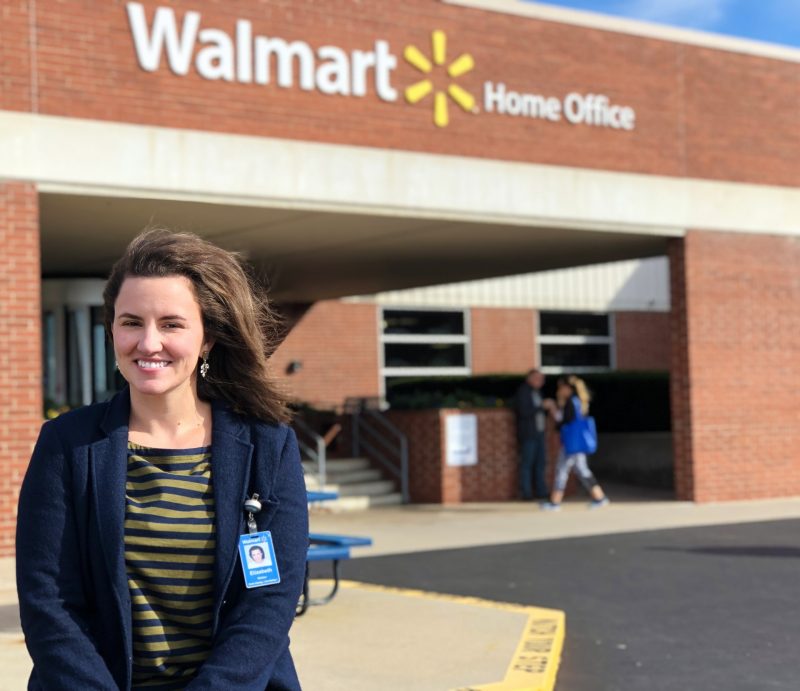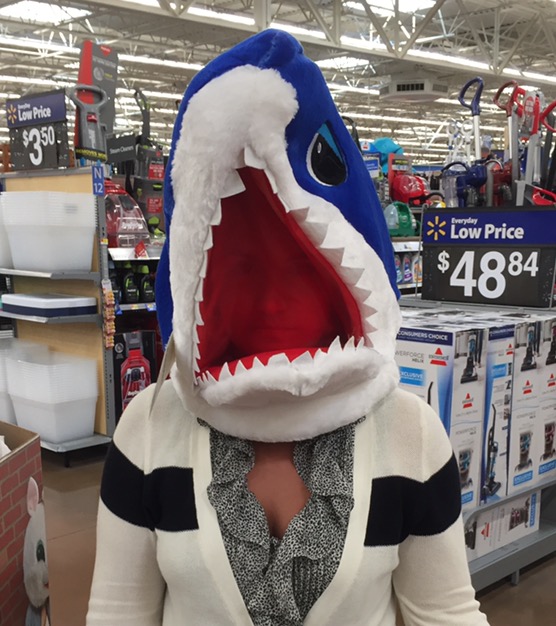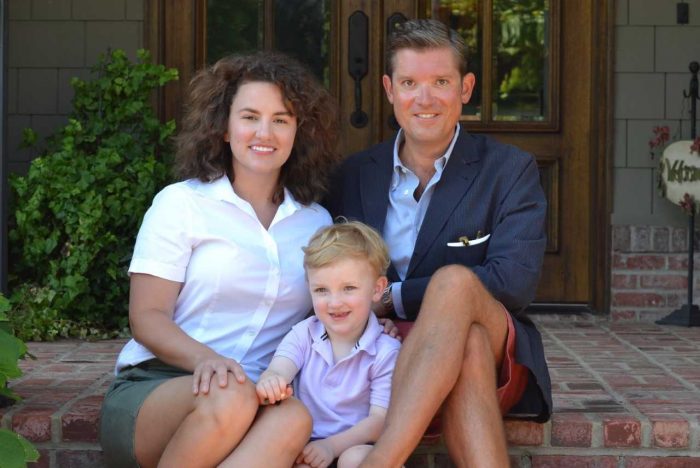Elizabeth Stainton Walker:
English M.A. Alum Working in the Corporate Sector

Elizabeth Walker at the Walmart Home Office in Bentonville (Photo by Jennifer Deshields)
Elizabeth Stainton Walker is a familiar figure in the Department of English due to the many ways she has helped our students and faculty over the last decade. Not only is she an alum of our English M.A. program (’13), she has taught Composition courses as a graduate teaching assistant, worked in our department office, and made herself readily available–even after moving on to jobs with Sam’s Club and then with Walmart–to visit with our current students about professionalization tactics they can apply on the alt-ac job market. Now, once again, she has taken time out of her busy schedule (as Manager of Executive Communications at Walmart, freelance writer, wife, and mother) to assist us, this time by answering some interview questions for our alumni profile blog. In her responses, below, she talks about the extra years (beyond those for coursework) she took to wrap up her M.A. degree; the value she sees in our new portfolio option for M.A. students planning to enter alt-ac careers; strategies she would recommend for locating competitive alt-ac job opportunities; her capacity to transfer skills from graduate school (in English) to the corporate sector (as well as the importance of her being able to learn new skills on the job); her advice to department graduate advisers for how they might further support M.A. students’ exploration of alt-ac positions; and one particular Walmart service students might try out to relieve graduate-school-related stress.
You entered our English M.A. program in 2008. You took classes and taught as a graduate teaching assistant, and then you worked in our main Department of English office for a few years before you graduated in 2013. So, there was some time in between your completion of the first two years (when you were a full-time student) and your graduation from the program. You initially were planning to write a thesis, as I recall, but then you ultimately chose to take the comprehensive exam.
While the majority of our M.A. students typically finish the degree program in two years, a number of them decide to take longer to wrap up. Could you talk about why you gave yourself some extra time to finish, why you switched from the thesis to the exam option, and how you motivated yourself to get done once you had left the program to start a full-time job, start a family, etc.?
I don’t think we necessarily “decide” to take longer to graduate. We just run out of time on our assistantships, and then life – and bills – get in the way of our academic work.
I wanted to write a thesis, but I never found something I was passionate enough about to devote that many pages to composing. As a result, the thesis felt intimidating and draining. The exam option was “snackable.” That is, I could study a little bit at a time. Plus, since the exam dates were already set, there was a clear deadline.
For me, the game-changer was working on campus. Having an inside track allowed me to get my questions answered right away, both by other campus offices or English Department professors. I think many students lose steam once they leave campus and then become fatigued by the red tape. Navigating the bureaucracy was much easier from the inside. It’s a lot easier to get an answer when you are standing right in front of someone.
I find this to be a good strategy today when I cannot get someone to respond to my email.
As you know, we no longer offer the comprehensive exam as an option for finishing the degree; now, our M.A. students must choose between the more traditional thesis project and a portfolio project (completed as part of a Portfolio Workshop class the students take in their final semester). The portfolio compares with the thesis project in average length (around 55-80 pages), but the portfolio is structured quite differently. The portfolio has to include two to five separate documents: at least one has to be a critical essay revised for publication, while the other texts can be a combination of critical essay(s), pedagogical tools, multi-media pieces, job materials, etc. If you were in the M.A. program now, what final project would you choose? Why?
The portfolio option sounds more in line with the documents I produce now, and I think those would be more helpful when applying for jobs. When a prospective employer asks for a writing sample, he or she is probably not going to read your entire thesis. It’s also great if you can create a number of types of documents to demonstrate a wide range of talents. For example, you might author a blog, create an infographic, and write a white paper [researched report] about your given topic.
Of course, I still hold out dreams that the muse will speak to me, and I will write a thesis, dissertation, novel, memoir, etc.
It was while you were still working here, at the Department of English, that you found an administrative job with the Sam’s Club home office in Bentonville. Then, within another year or two, you were hired as the Manager of Executive Communications for Walmart, where you still work in that position. Do you mind sharing how you found out about such positions being open? To locate competitive alt-ac opportunities for English M.A. students/alumni, do you recommend that one visit a company’s website, network madly with anyone already working at the company, utilize a wide variety of job search engines, and/or try another strategy?
I think it is a combination of all of the above tactics. My strategy was to submit a high volume of applications, tailor my cover letter to the specific position, and learn as much about the company as possible before an interview. There are many possible paths, of course.
In my case, I chose to take a “foot-in-the-door” position because I saw and heard about a number of young women advancing their careers within Walmart. If I was overqualified in terms of academics, I was underqualified in terms of practical knowledge of retail. That first role after leaving the English Department allowed me to increase my knowledge of the company and the corporate sector while I contemplated my next move.
As far as networking, it is as simple as this: if you meet someone with a cool job, ask them to get coffee and tell you more about what they do. They will probably be delighted. Make sure you treat that meeting like an interview – dress nicely, be on time, pay attention, and take notes.

Elizabeth Modeling the Latest Walmart Merchandise
You are obviously doing very well as an “English Lit person” transplanted from academia to the corporate realm. You’ve previously explained to me that one of your main responsibilities is managing the incoming correspondence for Walmart leadership. You also have to complete various types of corporate-related research. How easy has it been for you to transfer the skill of being able to research a paper on Shakespeare, for example, to a job requiring you to research a venue for a Walmart executive’s upcoming speaking engagement? How do the revision and editing skills that you honed as a graduate student apply when you are updating a Walmart executive’s bio on the company’s website? Are your skills from graduate school really transferring at all, for that matter, or are you mostly having to learn new skills as you go along?
Both. Many skills are transferring, and I have had to learn a great deal since beginning my job.
My English degrees helped me see things through different lenses and to look at things from a variety of different perspectives and viewpoints. For example, as I compose a document, I might look at it from the viewpoint of a customer, a shareholder, a Walmart associate, and maybe even someone who knows zero about Walmart.
I am fortunate to work with a lot of really smart people, including subject matter experts, longtime media veterans, and folks with years of political experience. As a result, I am constantly learning new skills and developing my judgment, to make me better at my job.
At Walmart, you’ve likewise had some cool opportunities to contribute write-ups for the corporate blog, including one (last April) focused upon the “Crotilla,” a hybrid food that Walmart was beginning to sell in their stores around that time. I’m guessing the publication of these posts more directly draws upon your experiences as a graduate student: researching, drafting, and revising (over and over and over again). Have you found other opportunities to read, research, and write–basically, to feed your inner English major/graduate student–either in the workplace or at home?
The experience of researching for my job now is very different than researching for schoolwork. When I would research and write a paper for a class, it was largely a solitary activity. I was often the only person to see the work before turning it in to be graded.
The work I do now is more collaborative, and many other stakeholders need to approve something before it goes to print or goes live on a website. Sometimes it can be tough to take criticism, but, as I say, I work with a lot of really sharp people, and usually their feedback is spot-on.
You and several other alumni generously served on the English Department’s alt-ac panel this past spring. Any quick suggestions for our graduate advisers regarding what more we can do to make our graduate students in English aware of the range of alt-ac careers that may be available to them? Is this something we can take an organized advising approach to, or would you say the success of the alt-ac job search depends mostly upon the individual student’s effort (since the number and types of these jobs are too vast)?
I have been heartened by the recent efforts of the department to prepare students for their next steps. I think we could do more to encourage students to get the skills and training they will need after graduation – to make sure they can use Excel, Adobe, and PowerPoint effectively.
That said, I realize the students might not have much appetite for that kind of thing. I certainly would not have wanted to take a business course or an Excel workshop! But I do wish I had that tool in my toolkit now. Perhaps one should be required to pass a Microsoft Office proficiency test in addition to a foreign language exam.
For the last question, you can choose between the following: 1) What is one assignment you completed as an M.A. student of which you are particularly proud? OR 2) What is one Walmart product that would be perfect for relieving graduate-school-related stress?
Not so much a product, but a service: Walmart now offers grocery pickup at many locations. You can order online, pull up outside your local store, and let an associate load up your car while you read Jane Eyre. What’s not to love?

Elizabeth with Husband Drew (Also a Graduate of the M.A. Program) and Son George, Age 3 (Photo by Tara Stainton)
